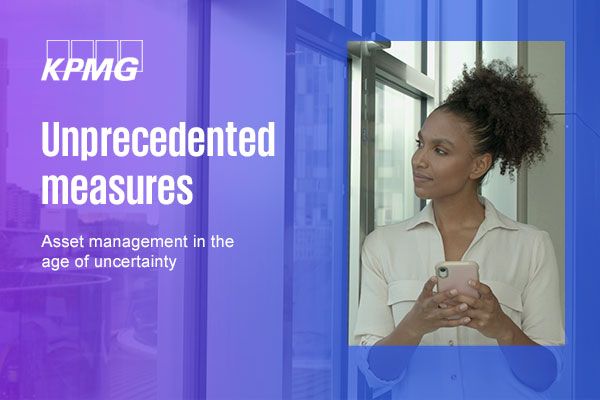Here is how the leading Asset Managers are preparing for what comes next.
These are interesting times. Central Banks are raising interest rates aggressively. Not in living memory have equity markets and bond markets tanked at the same time. It has been decades since investor confidence was this low.
What makes the current situation challenging, however, is that this is all happening in the midst of a massive global effort to reengineer the world economy to be greener and more equitable. Add in the disruptive power of some of the technologies emerging today (generative AI in particular) as well as the dislocation being caused by geopolitical turmoil, and it seems clear that market fundamentals are under considerable stress.
The impact on the asset management industry has been significant. High inflation and expectations of a recession have pushed down asset valuations. That, coupled with a clear shift of funds into cash and deposit accounts, suggests that industry AUM is shrinking. For many managers, that means management fees are under pressure.
Investors are jittery. The firms and individuals KPMG Professionals talk with – institutional investors, sovereign wealth funds and high-net worth individuals and family offices, for example – say they are experiencing a crisis of confidence. They are moving closer to managers they already know and trust. They are looking for the security of money market funds, value-protected funds and private market investments. They want transparency and, increasingly, to make an impact with their investments.
Finding your opportunity
Some asset managers may view this period as a massive risk. Others see it as an opportunity. Yet the opportunities may look rather different depending on what end of the AUM spectrum you play.
For the biggest players, the crisis of confidence amongst investors has led to steady inflows. These players are orienting around market demand and recent trends, focusing on ETF and private market investments in particular. But they are also using their weight and size to develop and expand new offerings and capabilities, often running ahead of investor trends thanks to slick data and analytics and lots of cash to invest.
Fundraising may be more of a struggle for smaller players. But they also have big opportunities to stand out in this current market reorganization. Investors are looking for personalized service. They want specialist capabilities. They expect their money to be invested with purpose and values. Smaller managers and those operating in niche sectors could – with the right focus and effort – create a compelling value proposition for investors.
Where is it all going?
What most asset managers seem to recognize is that their business is in the midst of a significant disruption. This is not a short-term economic blip or some sort of market correction. The fundamentals of the asset management industry are changing. The need for new ideas and new models has never been more urgent.
Finding trust in technology
While this may seem like a challenging mix of priorities to juggle, technology is already playing an enabling role, particularly in allowing managers to get closer to their clients, innovate their product offering and deliver transparency.
Retail asset managers, for example, are exploring opportunities to tokenize ETFs using blockchain technologies, both as a way to make their products more accessible and as a way to get closer to clients (tokenization allows managers to cut out the intermediaries). In much the same way, real estate players are also looking at tokenizing their asset portfolios. And hedge funds are starting to think about digital assets as an investable asset class.
Technology is also allowing the more innovative asset management firms to create new revenue streams and solidify existing ones. Over the past few months in particular, a growing number of asset managers bring have brought their internal tools and platforms to the market as a service. And smaller asset managers are using these technologies to allow them to focus on creating the best projects for their clients at the best price
Five steps to the future
KPMG member firms’ experience of working with asset managers to assess their future business models, operating models and value propositions suggests there are five things that asset managers could start doing today in order to prepare for the changes coming in the very near future.
Understand your clients
Client needs and expectations are changing rapidly, as are their investment goals. Consider how you can get closer to your clients – perhaps by working more closely with intermediaries to deliver personalized strategies (or removing some intermediaries entirely) – to better identify and predict future trends. Think about the types of products and solutions they may want in the future, as well as how they will want to interact with their asset managers and what type of information they may require.
Articulate your values and purpose
Climate change is one of the world’s biggest challenges. And asset managers are perhaps in a unique position to use their investment decisions to achieve real world impact and to drive positive change by helping their investee companies reduce their environmental footprint and develop greener products and solutions. Those who articulate their purpose to society and investors can differentiate in a highly competitive and value-driven market.
Communicate continuously
Communication is a key enabler of purpose and client-centricity. Gone are the days of quarterly investor communications and compliance reports. Today’s leading asset managers are continuously communicating with their stakeholders on a wide range of topics. And that is helping them build trust with their customers, employees and regulators. As the past few months have made clear, open and transparent communication between firms, managers and their investors can be critical in managing a crisis when needed.
Reassess your business and operating model
The shift in client expectations and sagging margins is creating pressure on current business models. That, combined with a clear trend towards value-based products and services centered around clients suggests that new business models will be needed. At the same time, asset managers should be looking for opportunities – perhaps through technology, process or outsourcing – to improve operational efficiency and business flexibility in the operating model.
Explore technology
From opportunities to use technology to drive operational efficiency and better client engagement through to the emergence of new investment opportunities and potential revenue streams, technology can deliver significant value to asset managers in today’s environment. Carefully consider how technology, culture and people intersect to ensure that technology investments are creating a positive impact and value for both clients and employees. Understand your future state model and start developing your technology roadmap to get there.
Setting a new precedent
Unprecedented times call for unprecedented measures. Asset managers should not simply maintain the status quo and hope to ride this disruption out. The only way to navigate the rapidly changing macroeconomic, geopolitical and social environment is to start undertaking radical change. In KPMG’s view those who do so with value, clients and purpose at the core will likely come out on top.

